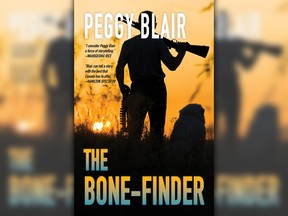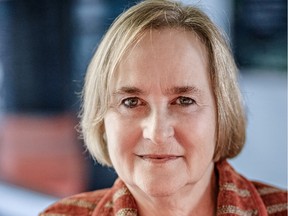Summer reading: A homecoming and a homicide in THE BONE-FINDER
When Ottawa homicide detective Charlie Pike is sent to Northern Ontario to help search for the bodies of two Ojibway boys allegedly murdered by a farmer, he stumbles on a completely different crime. Here's an excerpt from Peggy Blair's new novel.

Article content
Welcome to the Ottawa Citizen’s summer reading file, where we’ll feature new work by a local author once a week.
Eastern Ontario writer and publisher Peggy Blair was a lawyer for more than 30 years. A renovator, artist and Level 6 boxer, she is the founder of ReBound Press, and established the Toby Awards for independently published Canadian authors. She has published six fiction novels and one book of non-fiction.
****
When Ottawa homicide detective Charlie Pike is sent to Northern Ontario to help search for the bodies of two Ojibway boys allegedly murdered by a farmer, he stumbles on a completely different crime. And the key to solving rests with the victim’s dog. Here’s an excerpt from The Bone-Finder.
CHAPTER 1
Her paws hurt. Just touching them made her whimper. The air was full of the lingering firesmell. The dog lifted her muzzle and sniffed.
The acrid air hurt her nose. She lay down, exhausted, and tried to conserve energy. Around her, the dying brown-green of things trying to survive the long drought: Grass, leaves, trees. Roots below the ancient dirt communicated with underground tentacles. She could smell their pathways carrying nutrients to fungal circles of primeval beings.
Her throat was parched. Her eyes burned from grey smoke that still hung in the air like painful clouds. She pulled a singed paw towards herself and licked her blistered pads, then turned her attention to the painful lump of metal buried in her side. She tried to gnaw it out, but it was embedded too deeply.
It was getting dark now, and tiny biting creatures hovered relentlessly around her eyes and her ears, driving her crazy. She snapped at them to keep them away, but they immediately returned to resume feeding.
She shivered from pain and loss, at the knowing and not-knowing what would happen to her now. The person who cared for her, the man she loved, was dead. She was still overwhelmed and confused by how quickly that happened. She’d known something was terribly wrong when the fire started. She stayed with him as long as she could, tugging on his arm, his pants, frantically trying to pull him to safety until the searing heat was too much.
She thought about limping out to the road. Maybe a passing car would see her and stop. She could bark to let them know where to find her human’s body. But in the distance, coyotes howled in triumphant song. They would begin to hunt soon, and they would follow the trail of blood she had tracked into the row of trees.
She wondered how long it would take them to find her. She wasn’t strong enough to fight them off. She curled up into a tight ball and made herself small, ears perked for the sounds of night creatures. She tried to ignore the worrying insects and did her best to be quiet, but she couldn’t stop shaking. She was hurt. Vulnerable. Frightened. Alone.
***
CHAPTER 2
The small bush plane bumped along the runway. There was no security door to separate the pilot and co-pilot from the passengers. Charlie Pike felt like he was stuck inside a tube of toothpaste.
The plane finally stuttered to a stop. When the pilot shut off the engine, Charlie immediately unhooked his thick black seatbelt and stood up. He removed the small white foam plugs from his ears and straightened his back until it cracked. He bent over slightly and stretched his legs to try to loosen the stiffness in them from the long trip.
He wasn’t a particularly tall man, but he still had to duck to avoid bumping his head on the ceiling panel. He walked down the short flight of stairs to the tarmac carrying his kit bag full of plastic markers and other police paraphernalia, extremely happy to feel hard ground beneath his feet again. It was going to be a hot one: the humidity hovered around him like an awkward roommate.
Charlie wasn’t comfortable flying. He sometimes wondered if that was because his Ojibway father was Ginoozheg, Fish Clan, and his Mohawk mother was Wolf Clan. His people came from water and earth. Air was a challenge; the worry of falling out of it ever-present when he flew.
A bush plane could hit a bird or a wind shear and drop like a stone. But the northern bush pilots were magicians. He’d heard stories of bush planes losing a propeller or an engine to bird strikes, and somehow the pilots landed without anyone getting hurt.
This young pilot doubled as a baggage handler. Charlie’s carry-on bag was at least a decade older than he was.
“Today’s supposed to be the airline’s sixtieth anniversary,” he told Charlie glumly as he handed the bag over. “Just found out we’re closing down our route to White Harbour in a couple of months. We don’t have enough passengers to keep it going.”
“I’m sorry to hear that,” Charlie said and meant it.
Travel to White Harbour from Ottawa took hours as it was. The tiny bush planes made numerous pit stops along the way. There were no real alternatives. Bearskin had cancelled its service a year or two earlier because of a softening mining sector. Charlie could fly to Winnipeg and rent a car to drive up, but he’d lose the better part of a day.
Bill Wabigoon wouldn’t be happy to hear the news either. He probably took more flights across the country than most executives did, what with Assembly of First Nation meetings and the usual cross-country circuit of regional chiefs.
Charlie entered the postage stamp-sized airport. The wall clock above the ticket counter indicated it was just past 11 a.m.
He’d been in transit for almost eight hours and had been up since three with nothing to eat. The bush planes were laughably removed from the kind of passenger service you’d see on a bigger airline. The co-pilot had handed out clear plastic bags that contained two foam ear plugs and one plastic-wrapped mint, and that was it.
Charlie’s stomach groaned loudly and persistently to get his attention, but a quick glance around the airport confirmed that the tiny airport didn’t have even a vending machine that sold junk food.
He walked out to the parking lot and looked around for his rental car. He found the white SUV just where the Esso station owner had told him it would be, with the ignition key tucked on top of a tire inside the wheel well.
He tossed his bag in the back seat and started the ignition. He yawned to clear his ears— they were still buzzing from the deafening flight. Even with the ear plugs, the plane’s engine was so noisy that his seat had vibrated as if he were sitting on a coin-operated massage chair.
He tried to figure out what to do first.
He really needed to get some food but decided he’d better check in with Bill Wabigoon to let him know he’d arrived. He wanted to talk to him anyway to see what Bill knew about Judith Cameron, the woman who’d reported the boys’ murders.
****
CHAPTER 3
Charlie drove slowly, getting familiar with the area again. His last visit to Manomin Bay was five years earlier to attend his auntie’s funeral, and his stay then had been brief. There were plenty of “For Sale” signs along the 562, which didn’t surprise him, but a good number of “SOLD” signs, which did.
He hadn’t been in the area on police business for fifteen years. Back then, a local entrepreneur, Malcolm Byers, had purchased the old pulp mill next to the reserve and planned to reopen it. Band members, supported by other local First Nations and masked Mohawk Warriors, had blockaded the access road to the mill after Bill found out that the mill’s forestry operations would release even more mercury into the bay. Byers finally gave up and left the mill shuttered.
Charlie felt a familiar sense of discomfort and unease as he turned onto the gravel road. He caught sight of a group of turkey vultures gliding above the trees like micro-light planes banking in graceful dihedral sweeps.
A few free-roaming rez dogs wandered along the shoulder. Others lay at the side of the road and barely lifted their heads when his SUV went by. Everyone kept an eye out for the dogs and fed them, and a few of the dogs probably had people who claimed them, but mostly they belonged to everyone and no one.
Half a dozen pickup trucks were parked in the lot next to the Band Office. Charlie pulled in beside one that had two bumper stickers on the tailgate that said “Running on NDN Time,” and “Probably Late for Something.”
Charlie chuckled. He didn’t own a watch: keeping track of time wasn’t something he considered all that important.
He was still smiling as he took the keys out of the ignition, and got ready to see the man who had etched jail tattoos on Charlie’s knuckles when they were both locked up in remand.
**

WHAT PEGGY BLAIR IS READING
This summer, I’ll be re-reading Ottawa native Chris Forrest’s critically acclaimed Detective Charlie McKelvey series, set in Toronto and Northern Ontario, so we can get it back in print through ReBound Press. I’ll also be reading UNDER PRESSURE, a thriller by Rob Pobi of Hudson, Que. in which Lucas Page, an astrophysicist and professor who was terribly injured in an explosion, is pulled into an FBI investigation.














Postmedia is committed to maintaining a lively but civil forum for discussion. Please keep comments relevant and respectful. Comments may take up to an hour to appear on the site. You will receive an email if there is a reply to your comment, an update to a thread you follow or if a user you follow comments. Visit our Community Guidelines for more information.